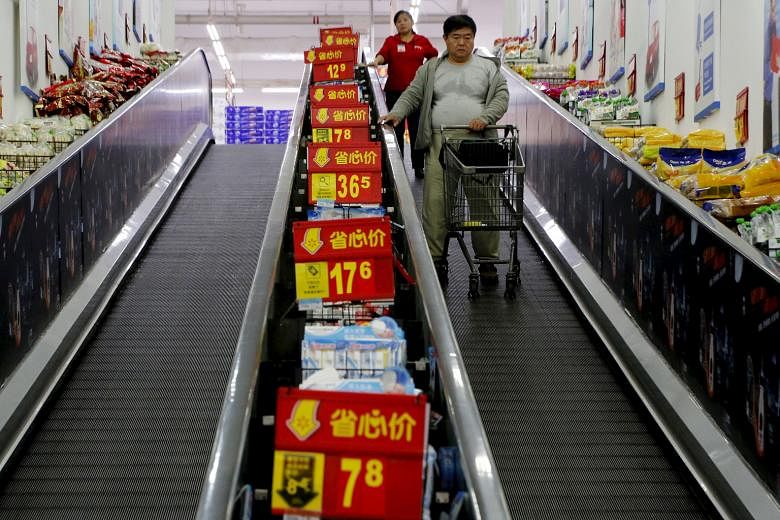China is targeting "medium-high" growth over the next five years as it seeks to achieve a goal of doubling the country's per capita income by 2020 from a decade ago.
While top Chinese Communist Party (CCP) leaders did not give a specific figure at the close of a four-day meeting yesterday, economists said Beijing's annual growth target is likely to be in the 6.5 to 7 per cent range - necessary for the 2020 goal to be met.
This is a dip from the current 7 per cent target in the 12th Five-Year Plan (2011 to 2015) and comes amid weakening growth in the US$10 trillion (S$14 trillion) Chinese economy. The five-year plans typically provide a road map for China's economic and social goals.
"We want to make economic growth more balanced, more inclusive and have it built on the foundation of sustainability," said a statement yesterday after the meeting, known as the Fifth Plenum, came to a close. "China is aiming to double its 2010 gross domestic product (GDP) and per-capita income of residents both in cities and rural areas by 2020," it added, referring to a goal that former president Hu Jintao announced in November 2012.
Dr Wang Xiaolu, deputy director of the National Economic Research Institute, said that, while some had expected Beijing to unveil specific targets that mapped out the 13th Five Year Plan, the overemphasis on GDP figures was unnecessary.
-
What was agreed
-
End the decades-old one-child policy, with all couples now allowed to have two children
Target medium to high growth for GDP in the next five years, which economists estimate at between 6.5 and 7 per cent
Continue green and sustainable development
Modernise and improve fiscal and tax systems
Significantly raise the share of consumption in growth
Place innovation at the core of development
Endorse the sacking of 10 Central Committee members, including former presidential aide Ling Jihua and ex-Hebei party chief Zhou Benshun
"China's target of doubling per capita incomes is a sufficient target as Beijing is now focusing on quality growth. Annual GDP targets are also typically unveiled only at the meeting of China's Parliament in March," he pointed out.
Still, economists' estimates fall in line with recently leaked comments by Premier Li Keqiang, who stated a minimum growth estimate of 6.53 per cent over the next five years. In a speech to CCP members last Friday, he said this target was needed to meet the government's goal of establishing a "moderately prosperous society", according to a Bloomberg article.
Yesterday, top Chinese officials also pledged to participate more actively in international affairs such as in global financial governance and climate change negotiations.
Experts, however, pointed out that highly anticipated personnel changes were left out from the plenum's announcements.
There had been talk that General Zhang Youxia, 65, director of the general armament department and one of President Xi Jinping's trusted men, could be promoted to Central Military Commission (CMC) vice-chairman. Gen Zhang had been tipped for promotion since last year due to his military credentials and loyalty to Mr Xi.
General Liu Yuan, the political commissar of the People's Liberation Army's (PLA) general logistics department, who led the army's anti-graft campaign, was also touted to enter the CMC.
But there were no such announcements. There was also no mention of changes to the PLA structure - such as adopting a United States-style joint command structure, or consolidating the army's military command regions.
These changes had been bandied as part of the reforms that Mr Xi wanted to push through to modernise the PLA, amid his anti-corruption sweep of the military that saw former top CMC leaders hauled up.
Hong Kong-based analyst Willy Lam believes the disruption caused by the removal of former CMC vice-chairmen Xu Caihou and Guo Boxiong for corruption may have disrupted plans of further changes.
"Xu and Guo were influential and would have had many prodigies still in the PLA," he told The Straits Times. "It appears they aren't ready to make more changes yet."

